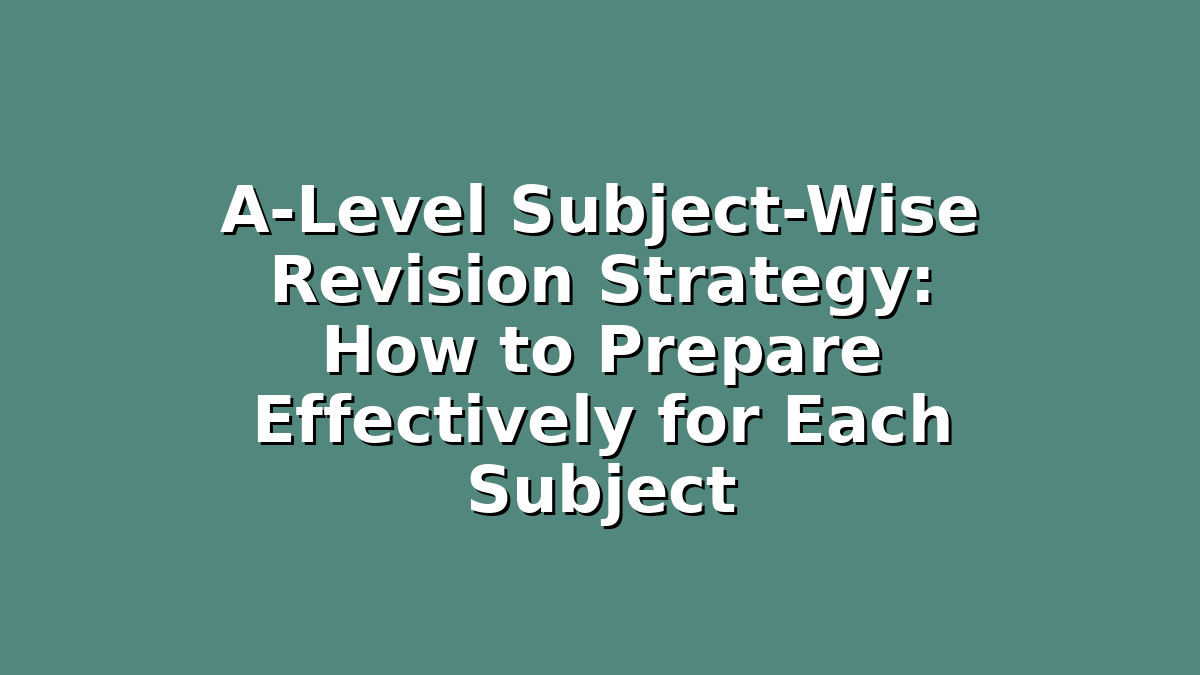Preparing for A-Level exams can feel overwhelming, especially when you’re juggling multiple subjects with different content types and exam formats. However, having a clear, subject-wise revision strategy can make all the difference. Tailoring your study methods to suit each subject’s unique demands will help you maximize your efficiency, reduce stress, and boost your confidence going into exam day.
In this article, we’ll guide you through practical, subject-specific revision strategies that are designed with A-Level students in mind. Whether you’re tackling essay-heavy subjects like History, data-driven courses like Mathematics, or content-rich sciences like Biology and Chemistry, this guide will help you revise smarter, not harder.
—
Understanding the Nature of Each Subject
Before diving into detailed study techniques, it’s important to understand that every A-Level subject requires a slightly different approach. Some subjects demand memorization of facts, others rely on problem-solving skills, while some require critical analysis and essay writing. Knowing what kind of knowledge and skills your subject tests will help you tailor your revision strategies effectively.
—
1. Revision Strategies for Essay-Based Subjects (English Literature, History, Psychology)
Essay-based subjects often require you to demonstrate deep understanding, analysis, and the ability to construct coherent arguments under exam conditions. Here’s how to approach revision for these subjects:
a. Create Clear Topic Summaries
Condense your notes into concise summaries for each topic or unit. For History, this might mean timelines and key event summaries. For English Literature, it’s helpful to create character profiles, theme breakdowns, and plot summaries. Psychology students should summarize theories, studies, and key terminology.
b. Practice Past Paper Essays
Writing essays under timed conditions is crucial. Past papers will help you get used to the question styles and time constraints. After writing, spend time reviewing and self-critiquing your essays or seek feedback from teachers.
c. Make Use of Mind Maps and Flashcards
Mind maps help visually organize ideas and link related concepts, which is especially useful for subjects that require connecting themes or theories. Flashcards are perfect for quick revision of key terms, definitions, and theorists.
d. Discuss and Teach
Engage in study groups or explain your notes aloud to someone else. Teaching others is a powerful way to reinforce your understanding.
—
2. Revision Strategies for STEM Subjects (Mathematics, Physics, Chemistry, Biology)
Science and math subjects demand a mix of memorization, understanding concepts, and applying knowledge to solve problems. Here’s how to optimize your revision for these disciplines:
a. Practice Regular Problem-Solving
For subjects like Mathematics and Physics, consistent practice is essential. Work through problems methodically, starting with simpler questions to build confidence and progressing to challenging ones to deepen understanding. Use past exam questions to familiarize yourself with common question formats.
b. Understand Concepts, Don’t Just Memorize
Especially in Chemistry and Biology, ensure you understand the underlying principles and processes instead of rote memorizing facts. Use diagrams and flowcharts to visualize processes like chemical reactions or biological systems.
c. Use Summary Sheets and Formula Sheets
Create concise summary sheets with key formulas, definitions, and essential concepts. This will be your quick reference guide during revision sessions.
d. Conduct Mini Quizzes
Test yourself regularly with quick quizzes or flashcards to reinforce memory and identify weak areas.
e. Watch Online Tutorials and Use Apps
Sometimes a different explanation can make complex concepts clearer. Supplement your revision with quality online resources, videos, and interactive apps.
—
3. Revision Strategies for Practical and Coursework-Heavy Subjects (Art, Media Studies, Design Technology)
Subjects with significant coursework or practical components require a balance of creative work and theory revision:
a. Break Down Coursework Tasks
Plan your coursework deadlines carefully, breaking down larger projects into manageable chunks. Use a timetable to allocate time for research, drafting, and finalizing your work.
b. Reflect on Feedback
Incorporate feedback from teachers on coursework drafts to improve your final submission. This is often an area where students can gain extra marks.
c. Revise Theory in Context
For Media Studies or Design Technology, theory often relates directly to your coursework or practical projects. Use revision notes that link theory to your own work or case studies.
d. Practice Presentation Skills
If your subject involves presenting your work, practice speaking clearly and confidently. Record yourself or run through presentations with friends or family.
e. Use Visual Revision Techniques
Create mood boards, storyboards, or annotated sketches to review key concepts and creative approaches.
—
General Tips for Successful A-Level Revision
While subject-specific strategies are essential, some general tips apply across the board:
– Start Early and Plan Ahead: Make a revision timetable that balances all your subjects and stick to it. Starting early reduces last-minute stress.
– Take Regular Breaks: Use techniques like the Pomodoro method (25 minutes study, 5 minutes break) to maintain focus.
– Stay Active and Eat Well: Physical exercise and good nutrition improve concentration and memory.
– Sleep Well: Aim for 7-9 hours of quality sleep to consolidate learning.
– Stay Positive: Remember, revision is a marathon, not a sprint. Celebrate small achievements to keep motivation high.
—
Conclusion
A-Level exams are challenging but manageable with the right revision strategy tailored to each subject’s demands. Whether you’re cracking essay writing, mastering problem-solving in STEM subjects, or balancing coursework with theory, adopting specific revision techniques will help you feel prepared and confident.
Remember, effective revision is about quality, not just quantity. Focus on understanding, practicing, and reviewing intelligently. With consistent effort, positive mindset, and the right methods, you’ll be ready to excel in your A-Level exams.
Good luck!
—

Responses